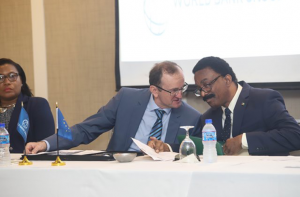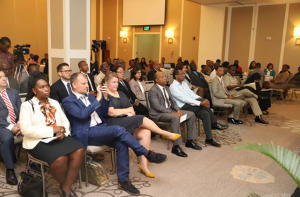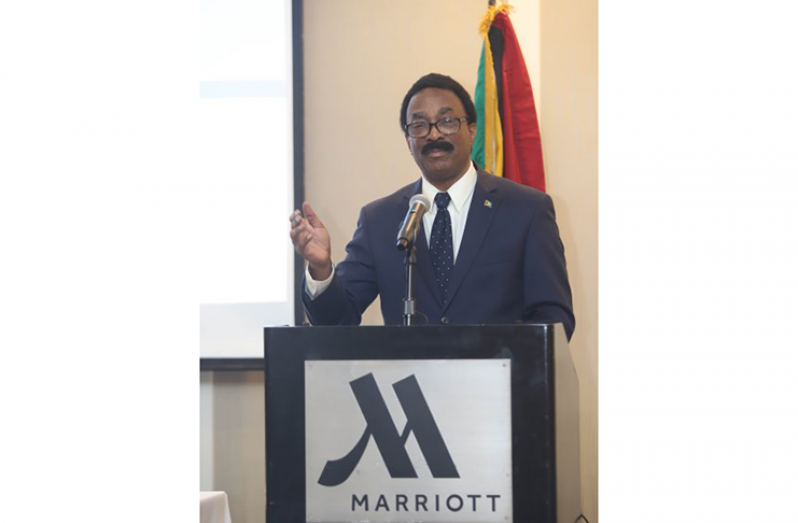…AG says growing economy a breeding ground for criminals
By Navendra Seoraj
GUYANA’S emerging oil and gas sector will spur “significant growth” in the local economy, but while this development is positive for the country, the Attorney General (AG), Basil Williams, believes that the authorities have to be watchful since a growing economy is a breeding ground for criminals.
As Guyana undergoes its second Money Laundering and Terrorism Financing (ML/TF) National Risk Assessment (NRA), the AG said the country must be cognisant of the additional risks and vulnerabilities. This second round of NRA being conducted for a period of 10 months – from December, 2019 to September, 2020, is in keeping with the World Bank’s recommended three-phase process. The assessment will allow the country to identify emerging money laundering and terrorist financing threats and vulnerabilities.
“Embarking on a second NRA is timely for Guyana as we are now an oil-producing nation. This new sector will change our financial landscape and in fact the landscape is already being changed. For instance, there has been an increase in business and investment and our economy is continually growing.

“While this development is a positive for Guyana, we must remain vigilant as a growing economy brings with it additional risks as it is a breeding ground for criminals. As an oil producing nation, Guyana will experience great transformational benefits.
“Therefore, it behooves us, in keeping with our international obligations, to protect the country from exploitation by criminal elements, to assess what exactly our risks are in relation to the oil and gas industry,” said AG Williams during his remarks at a World Bank-sponsored workshop on the NRA, at the Marriott Hotel, on Wednesday.
Overall, this second NRA exercise is relevant as Guyana is preparing for its Fourth Round Mutual Evaluation by the Caribbean Financial Action Task Force (CFATF), which is scheduled for the first quarter of 2023. In 2023 Guyana will have to demonstrate, in addition to having the laws and institutions in place, that the country is also effective in mitigating ML/TF/PF risks.
Accordingly, this exercise will enable the relevant authorities to assess the implementation measures taken by key stakeholders to address deficiencies identified by the first NRA and allow the country to commence addressing any new vulnerabilities and threats ahead of its scheduled mutual evaluation.
NEW AREAS
“In an effort to ensure that we are addressing our risks, threats and vulnerability in a comprehensive manner, this new NRA will explore some new areas that were not previously assessed in the first NRA.
“These are the ML/TF risk associated with proliferation financing, illegal wildlife trade, virtual assets and the oil and gas sector. By addressing these new areas, Guyana will be taking a proactive approach in protecting her frontiers from criminal elements,” said AG Williams.
Looking to the future, the AG advised persons that they must not underestimate the level of environmental crime and the harmful effects, which criminal activity in this area can cause to the country.
He said the natural resources, unique fauna and flora, may be subject to irreparable harm and exploitation. And, in that regard, the NRA is expected take into account the level of threats towards the wildlife trade and the use of the proceeds of this trade, whether as profit, or to further finance other criminal intentions, including but not limited to corruption by public officials.
Addressing the risks and implementing appropriate measures in this area will ensure that environmental rule of law prevails.
Further to this, he said: “we also have to face the reality that virtual assets will play a big role in the future. It has been shown that the use of virtual currency has facilitated money laundering through exploitation and trafficking of the worst kind, including human and organ trafficking, due to the difficulty in tracing some virtual currencies back to their original source.”
Additionally, understanding proliferation financing risks will improve Guyana’s awareness of this illicit activity and strengthen the country’s ability to respond.
“We cannot afford to be caught sleeping where the creation or transportation of weapons of mass destruction by states and non-state actors are concerned,” Williams advised.

Government’s efforts to improve resilience against money laundering and terrorism financing started when the first NRA was conducted in 2017.
The institutional systems in place during the years 2012-2016 were assessed during the first NRA.
The results of the first NRA showed that Guyana had a lot of work to do, especially having been referred to the CFATF/ICRG process in 2011.
According to AG Williams, the results of the first NRA, in summary, showed that the overall money laundering risk for Guyana was rated as high.
“Regarding the terrorist financing risk, the threat level was rated as medium as there is legislative framework in place to identify, report and investigate terrorist financing,” said the AG, adding that the national vulnerability to money laundering was rated “medium-high”.
The assessment also established that the attorneys-at-law, accountants, trust company service providers, house/great estate agents, used car/spare parts dealers, and friendly societies/registered charities have very high money laundering vulnerability ratings.
AG William’s said illicit drug trafficking, gold smuggling, corruption and organised crime were rampant in Guyana.
However, since coming into office, the coalition government has taken a stand against corruption and President David Granger gave a high level commitment to the Financial Action Task Force (FATF), to ensure that Guyana complies with its obligations.
The AG said Guyana has made significant progress in addressing the strategic AML/CFT deficiencies that were identified by the FATF.
As a result, government was able to come off the infamous FATF list of non-compliant countries and successfully exit the third round of mutual evaluations.
Accordingly, several amendments were made to the Anti-Money Laundering and Countering the Financing of Terrorism Act and other Acts.
Additionally, the Anti-Terrorism and Other Related Activities Act, State Assets Recovery Act, Witness Protection Act, Protected Disclosures (Whistleblower) Act, and the Integrity Commission (Amendment) Act, were passed.
“Our institutional frameworks were also enhanced through the establishment of the State Assets Recovery Agency and existing institutions were strengthened,” said Williams.
Government had also constituted the National Coordination Committee for money laundering, terrorist financing and proliferation financing, which conducted outreach through the length and breadth of Guyana.
The working group comprises representatives from both the public and private sectors. There are persons from a large cross section of agencies, including the Attorney General’s Chambers, the State Assets Recovery Agency, the Customs Anti-Narcotics Unit, the Financial Intelligence Unit; the Guyana Revenue Authority; the Guyana Geology and Mines Commission, the Bank of Guyana and the Department of Cooperatives.
There are also persons from the banks and financial inclusion entities as well as the trust and insurance sectors. Owing to the importance and intensity of the group’s work, the Attorney General’s Chambers and the Ministry of Legal Affairs will be seeking to provide a small stipend to the persons participating in the Working Group.
Further, government has constantly been training persons and building capacity which has enabled the relevant and supervisory authorities to efficiently execute their mandate.
Additionally, Guyana can now boast of having several trained CFTAF Assessors who are now equipped with the requisite knowledge to competently advise their organisations on the necessary measures to implement, to successfully combat ML/TF/PF.
There has also been financial investigation and countering the financing of terrorism training, through the assistance of donor partners such as the European Union and the World Bank, as well as the CFATF.
The success of government’s efforts was recently recognised when Transparency International, in its 2019 report, noted that Guyana had significantly improved in its Corruption Perception Index, reaching its highest score in history.
This, Williams said, is a significant achievement as it demonstrates this government’s commitment and success at fighting corruption.
Despite the successes, the AG encouraged persons to be cognisant that society is changing rapidly.
“We must be cognisant that our society is continually changing and evolving and for this reason a second NRA is critical,” said Williams.
A comprehensive NRA allows government to lay the foundation for implementing mitigating measures based on a risk-based approach. However, risks are not static as the complexity and scope of financial crimes evolve almost daily as a result of new technologies, products and the emergence of new sectors.
“Government, in this regard, is heavily committed to protecting its citizens, and will take necessary actions to ensure that Guyana remains a safe and stable society,” said Williams, noting that work on the NRA will ensure the continued integrity of the local financial system.



.jpg)









